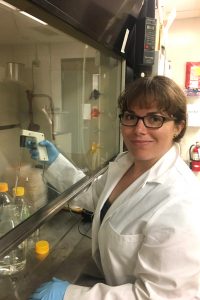
UM doctoral student Amelia Clayshulte hopes to use her time this summer at the Smithsonian Tropical Research Institute to further her own research into marine sponges and their relationships with coral reef species. Submitted photo
OXFORD, Miss. – Amelia Clayshulte, a second-year doctoral student in the University of Mississippi School of Pharmacy, has been accepted into a tropical taxonomy course at the Smithsonian Tropical Research Institute.
The internationally competitive course takes place at the Bocas Research Station in Bocas del Toro, Panama, for 21 days this summer. Clayshulte, from Las Cruces, New Mexico, will be among about 15 students participating in a course titled “Understanding Relationships of Non-bilaterian Metazoans: Sponges.”
“I am very excited for this opportunity,” Clayshulte said. “My adviser informed me of the opportunity, and I thought it was particularly relevant to my research.”
Clayshulte’s research focuses on how environment affects sponges’ energy budgets, including how many calories the animals have at their disposal for basic life processes such as growth, reproduction and injury healing. This research recently earned her third place overall in the graduate student presentation at the annual meeting of the Mississippi Academy of Sciences.
While in Panama, Clayshulte will learn about the taxonomy, evolution and ecology of marine sponges, as well as conduct physiological experiments with sponges.
“I have a passion for genetic studies, especially those related to evolutionary phenomena,” Clayshulte said. “Sponges are not particularly easy animals to grow in the lab, so I’m hoping this course might will help me learn how to design experiments for these types of studies in the marine environment.”
Marc Slattery, a professor of pharmacognosy and environmental toxicology in the Ole Miss pharmacy school’s Department of BioMolecular Sciences, serves as Clayshulte’s adviser.
“Amelia’s research embraces a fundamental question surrounding coral reefs of how sponges impact community structure and function,” Slattery said. “Training in the Smithsonian sponge workshop will further her ability to identify sponges and their relationships with coral reef species, giving her experience relevant to her career aspirations and future research efforts.”